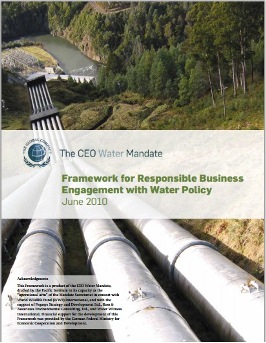Framework for Responsible Business Engagement with Water Policy

Framework for Responsible Business Engagement with Water Policy
Access to water is an important strategic concern for many companies, but increased threats to the supply, quality, and reliability of global water resources add substantial pressure and immediacy for businesses to improve the way they manage water risk. Recognizing that business, government, and civil society share a critical interest in reducing water-related risks through common solutions, the UN Global Compact’s CEO Water Mandate has released a Framework for Responsible Business Engagement with Water Policy to facilitate effective water policy engagement. The Framework, prepared by the Pacific Institute in collaboration with WWF International, provides a way for companies to address risk and capture opportunities from external conditions that cannot be achieved through internal strategies alone. The bottom line is the need for policy that integrates environmentally sustainable, economically viable, and socially equitable water management approaches. “We have an innovative model for companies to think about managing their business risk by engaging water policy and driving toward sustainable water management,” said Jason Morrison, director of the Pacific Institute’s Globalization Program and technical director of the CEO Water Mandate . “Ultimately, solving water problems requires not only better public policy and stronger institutions, but also inclusive and meaningful stakeholder involvement in decision making.” The Framework for Responsible Business Engagement with Water Policy broadens the understanding of corporate engagement as not just policy advocacy and lobbying, but also consideration of initiatives that involve interaction with government entities, local communities, and/or civil society organizations with two objectives: 1) the responsible internal company management of water resources within direct operations and supply chains, and 2) the sustainable and equitable management of the river basins in which companies and their suppliers operate. In the context of this Framework, sustainable water management addresses social equity, economics, and environmental issues in order to maintain the supply and quality of water for a variety of needs over the long term,” said Gavin Power, deputy director of the UN Global Compact and head of the CEO Water Mandate. “In many parts of the world, sustainable water management efforts could benefit from corporate engagement –- provided that this involvement is grounded in the concepts of equity and accountability, which must include stakeholder participation.” Overview

